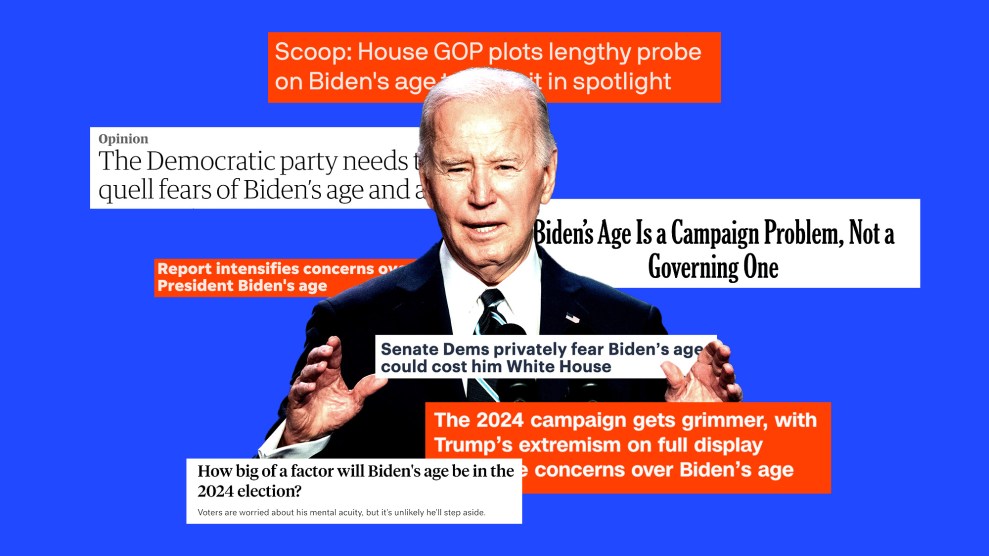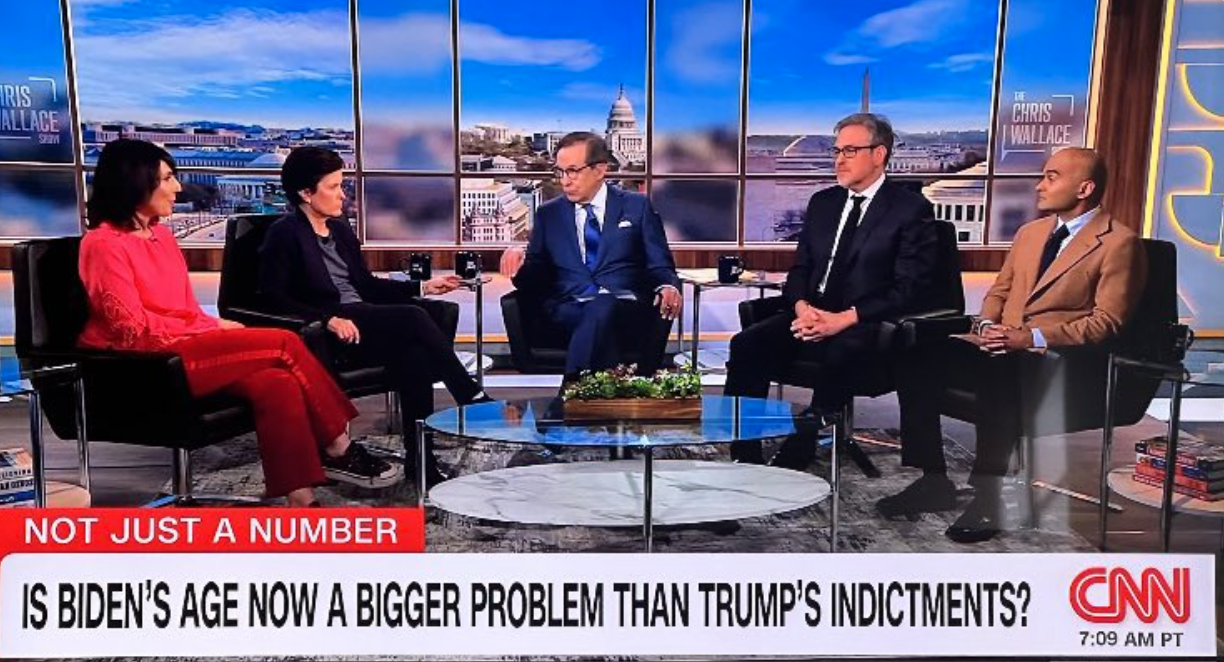
Mother Jones; Michael Brochstein/Zuma
Editor’s note: The below article first appeared in David Corn’s newsletter, Our Land. The newsletter comes out twice a week (most of the time) and provides behind-the-scenes stories and articles about politics, media, and culture. Subscribing costs just $5 a month—but you can sign up for a free 30-day trial of Our Land here.
Joe Biden’s age has become a black hole. The gravitational pull of this issue is shaping—or misshaping—the political cosmos. In recent days, it overshadowed Donald Trump’s apparent reckless invitation to Vladimir Putin to invade NATO allies and his full-on use of fascistic rhetoric to attack the Democrats. And there’s a chicken-and-egg dilemma here.
Is Biden’s eight decades truly the paramount issue it seems to be or is this a product of media hype driven by the hit-job report issued by special counsel Robert Hur, a former Trump-appointed US attorney? A front-page New York Times article that sought to examine why Biden’s longevity is more of a problem than Trump’s 79 years pointed out that Trump has not “felt the same blowback.” It noted:
The response suggests profound differences, not only between the two men, but in how they are perceived by the American public, and in what their supporters expect of them—a divide that could play a major role in the coming presidential election.
Yes, the old perception angle. Left out of the equation by the NYT is how each man is portrayed. There is a relationship between public attitudes and media coverage. Obviously, some voters possess a degree of concern over Biden’s age, but that concern can certainly be heightened by how news outfits cover the matter. When the New York Times floods the zone with stories about Biden’s age—as it has done the past few days—is it reflecting popular unease or encouraging it? Probably both. During one of its many reports on the Hur report, CNN asked, “Is Biden’s age now a bigger problem than Trump’s indictments?”

Seriously?
It is definitely newsworthy that Hur’s report included derogatory observations about Biden’s memory. But these gratuitous descriptions were backed up only with snippets of purported evidence, and Hur’s editorializing about Biden’s memory seemed designed to spark the firestorm it did. What was lacking in the spasm of breathless coverage that ensued was context. Which is often the great sin of mainstream media.
To its credit, the Washington Post published a day-after piece that did offer a healthy dash of needed perspective. The article, based on interviews with scientists who study memory, reported:
They noted that the cognitive abilities of Biden and Trump can’t be evaluated based on anecdotal memory lapses. Formal evaluations are needed to truly assess someone’s brain health. But they noted that memory lapses at any age are surprisingly normal and, for most people, aren’t a signal of mental decline.
So forgetting this or that might not indicate a mental slide. But you wouldn’t know that from much of the coverage of the Hur report. Consequently, we don’t really know the full story about the inner workings of either Biden or Trump. Yet we’re all free to look at these two old guys—watch Biden walk stiffly and mistake the country governed by Egyptian president Abdel Fattah el-Sisi, or witness Trump confuse Nikki Haley with Nancy Pelosi, slur words, and utter gibberish—and render our own judgements.
There’s no denying—or ought to be no denying—that some voters do see Biden as lacking the vim and vigor they want in the leader of the nation, despite his accomplishments. I, too, would have preferred Biden to bid farewell because I assess that his age, fairly or not, is a drag on the Democratic ticket—particularly for younger voters and voters who don’t follow politics as closely as you or I do. Yet if this topic is prioritized in the press above the threat that Trump poses to American democracy (and sensationalized), the national debate is warped and the republic imperiled.
As most Americans agree (according to polls), Trump tried to overturn an election and subvert the constitutional order. Speaking at a rally in South Carolina on Friday, he referred to the insurrectionist January 6 rioters who have been convicted as “hostages” and complained they are being “unfairly imprisoned” (while QAnon music played in the background). This is a former president and current presidential candidate legitimizing political violence, as well as a bonkers conspiracy theory. That is crazy. Yet this remark has gone largely unnoticed. Like many of Trump’s outrages it draws little more than a shrug from the national press—and no reaction from the leaders of his own party.
Why do Biden’s purported memory lapses receive more ink? Perhaps because it’s easier to spot or understand—and because people have become numb to Trump acting erratically and spouting outlandish stuff, which is basically his brand. The question is how should the media and the politerati process the Biden matter while giving at least equal attention (if not more) to Trump’s own possible cognitive issues and his alleged criminality and dangerous narcissistic authoritarianism? This appears to be a challenge for reporters working within the traditional confines of political reporting.
It’s also a tough subject for Democrats to handle. In the days since Hur’s report was released, numerous people have asked me how the Democrats could replace Biden as their 2024 banner carrier. If prominent Dems called on him to withdraw, wouldn’t that work? And why doesn’t a top Democrat enter the party’s primary contest? (Rep. Dean Phillips doesn’t count.) I don’t know if any of this is under discussion within high-level Democratic circles. I’ve asked a few Democratic sources, and so far no one has told me they’re aware of such talk occurring (though some might not share that information if a conversation of that nature were underway). But I can suss out the difficult issues here.
Senior Democrats—say Chuck Schumer, Hakeem Jeffries, and Pelosi—would be highly unlikely to place public pressure on Biden to head home to Delaware unless they were sure that their suggestions would be heeded and that a well-known Democrat other than Vice President Kamala Harris would be willing to leap into the fray. Such a list probably includes California Gov. Gavin Newsom and Michigan Gov. Gretchen Whitmer. (Don’t ask me why so many Democrats are down on Harris. That’s a topic for another day. Let’s just stipulate that they are.) Why would they need this guarantee? Otherwise, they would be out there undermining Biden in a way that would definitely hurt him in November if he’s the nominee. Imagine if this group of Democrats or others publicly state that Biden should step aside and he does not. That declaration would be handily used by Trump and the GOP against Biden. The ads would be devastating.
As for another Democratic contender parachuting in, it’s too late for that. The deadline for getting on the ballot for the Democratic primary in most states has passed. For example, the deadline for California was December 15. Thus, the only non-Biden alternative path forward appears to depend on a Biden withdrawal. Is it possible for Democrats to mount a mutiny at their convention that manages to overturn the rule compelling delegates to vote for the candidate to whom they are pledged—which presumably would be Biden? This may be more the terrain of House of Cards. Bottom line: There’s no good mechanism for the Democrats to force Biden into retirement against his will. If he elects to bow out, the party can pick another champion.
In a way, it is indeed absurd to have such a conversation about Biden’s slips (if that’s all they are) when the presumptive GOP nominee represents a clear and present danger. But if the most important task at hand is to prevent a Trump restoration, should the mission for Democrats and progressives be to promote Biden as best they can (while highlighting the Trump threat) or find a way to field a new guy or gal? The first choice means figuring out how to overcome swing voters’ possible worries about Biden’s abilities. (And the Biden campaign and the party ought to try to accurately evaluate how deep these concerns are.) The second choice would require Biden’s assent and, if granted, could spark political chaos.
“Life is unfair,” John Kennedy once said. And it may be unfair that Biden faces political headwinds because of his age and verbal miscues and Trump does not. Still, this should not be ignored; complaining about it will not help Biden and the Democrats. Biden needs to do what he can to address the matter. (Challenge Trump to a bicycle race?) If he can’t offer a measure of reassurance, he ought to consider retirement—perhaps after the primaries—and allow the delegates to the Democratic convention to slug it out over who should be the nominee. He and his supporters have argued that he’s the only Democrat who has demonstrated he can beat Trump. But as time marches on, history does not always repeat.
David Corn’s American Psychosis: A Historical Investigation of How the Republican Party Went Crazy, a New York Times bestseller, has been released in a new and expanded paperback edition.
















